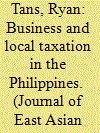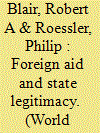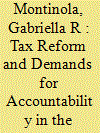|
|
|
Sort Order |
|
|
|
Items / Page
|
|
|
|
|
|
|
| Srl | Item |
| 1 |
ID:
177617


|
|
|
|
|
| Summary/Abstract |
This article argues that weak local governments increase levels of taxation by “borrowing” institutional capacity from certain types of businesses. While many businesses lobby against taxation, businesses that are locally owned, nationally connected, and logistically complex build robust associations that support taxation. These types of businesses benefit from improvements in public infrastructure, so they empower their associations to monitor members’ tax compliance and to pressure officials to uphold their spending commitments. The article demonstrates the necessity of business support for taxation in the absence of state capacity by comparing two Philippine cities that differ in their ability to tax despite a number of similarities between them. The case studies show that tax increases co-varied with business support, and that business support waxed and waned depending on over-time variation in the capability of business associations to discourage tax evasion and to enforce official commitments to spend on infrastructure.
|
|
|
|
|
|
|
|
|
|
|
|
|
|
|
|
| 2 |
ID:
178726


|
|
|
|
|
| Summary/Abstract |
What are the effects of foreign aid on the perceived legitimacy of recipient states? Different donors adhere to different rules, principles, and operating procedures. The authors theorize that variation in these aid regimes may generate variation in the effects of aid on state legitimacy. To test their theory, they compare aid from the United States to aid from China, its most prominent geopolitical rival. Their research design combines within-country analysis of original surveys, survey experiments, and behavioral games in Liberia with cross-country analysis of existing administrative and Afrobarometer data from six African countries. They exploit multiple proxies for state legitimacy, but focus in particular on tax compliance and morale. Contrary to expectations, the authors find little evidence to suggest that exposure to aid diminishes the legitimacy of African states. If anything, the opposite appears to be true. Their results are consistent across multiple settings, multiple levels of analysis, and multiple measurement and identification strategies, and are unlikely to be artifacts of sample selection, statistical power, or the strength or weakness of particular experimental treatments. The authors conclude that the effects of aid on state legitimacy at the microlevel are largely benign.
|
|
|
|
|
|
|
|
|
|
|
|
|
|
|
|
| 3 |
ID:
179131


|
|
|
|
|
| Summary/Abstract |
In January 2018, soon after he was elected President of the Philippines, Rodrigo Duterte signed a comprehensive tax reform bill. In this paper, a nationwide survey and embedded experiment are used to investigate how ordinary Filipino citizens responded to different possible changes in tax incidence originating in the reform. The survey was conducted a few days prior to the enactment of the legislation. Our survey experiment yielded two noteworthy findings. First, Filipino citizens’ interest in gathering information about the government budget and its usage increased when they were explicitly reminded of the possibility that the reform would change their tax burden; importantly, this occurred whether they expected their taxes to increase or decrease. Second, lower class citizens were more motivated than upper class citizens to monitor government when faced with the prospect of major tax burden changes. These findings not only shed light on how ordinary citizens in the Philippines reacted to the impending historic tax reform, but also reveal limits of the conventional fiscal contract conception of the link between taxation and accountability.
|
|
|
|
|
|
|
|
|
|
|
|
|
|
|
|
|
|
|
|
|